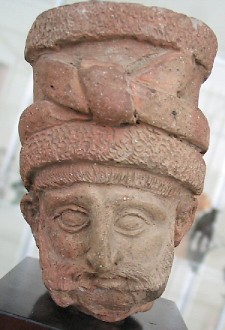Megabazus
Megabazus: Persian general, known to have conducted several campaigns in Europe in the last quarter of the sixth century BCE.

Our most important source for the career of Megabazus are the Histories by the Greek researcher Herodotus of Halicarnassus (fifth century BCE). He was with king Darius I the Great during his ill-fated expedition against the Scythians and remained in Europe after this campaign. As commander of the Persian army, he was ordered to pacify Thrace. This may have happened in the years after 513.
He conquered Perinthus, a Greek town on the shores of the Sea of Marmora (modern Eregli), and subdued the Paeones, who live along the upper reaches of the river Strymon in the west of modern Bulgaria. Although it is not mentioned, he must have added Ennea Hodoi on the lower Strymon as well, because this is a vital link between the conquered territories. The nearby port of Eïon appears to have been made the Persian capital. After this, he concluded a treaty with Macedonia, which became a vassal kingdom. After these successes, Megabazus returned to Persia.
So far Herodotus. There is independent confirmation of his words, because the list of countries subjected to king Darius on his tomb at Naqš-i Rustam (finished in 492?) is longer than the list that is included in the Behistun inscription (finished 519). Among the additions are the Thracians and the Yaunâ takabarâ, "Ionians with sun hats", i.e., Macedonians.
From the tablets found at Persepolis, we know that Megabazus' son Megabates was satrap of Arachosia, Gandara and Paricania. Probably, he is the same as the man who subdued Thrace and Macedonia. Megabates' son Megabazus was one of the fleet-commanders during the Persian campaign against Greece in 480 BCE.
According to Herodotus, the older Megabazus had several other sons: Bubares, Oebares and Pherendates. (The Greek author ignores Megabates.) The Greek researcher also records a brief Persian eulogy of Megabazus:
Darius once paid this man a high compliment: wishing to eat some pomegranates, he had just opened the first of them, when his brother Artabanus asked him which of his possessions he would like to be multiplied to a number as great as the seeds in a pomegranate. Darius' answer was: "Megabazus".note